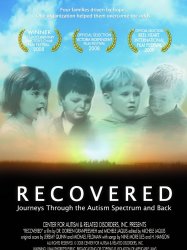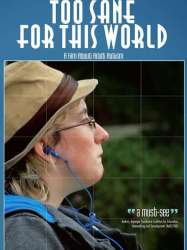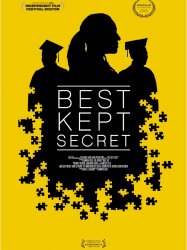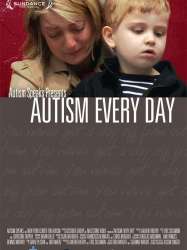Normal People Scare Me is a american film of genre Documentary released in USA on 5 may 2006
Normal People Scare Me (2006)

If you like this film, let us know!
- Infos
- Casting
- Technical infos
- Photos
- Videos
- Film quotes
- Characters
- Music
- Awards
Released in USA 5 may 2006
Length 1h30
OriginUSA
Genres Documentary
Themes Medical-themed films, Documentaire sur une personnalité, Documentary films about health care, Films about psychiatry, Films about disabilities, Films about autism
Rating73%










Normal People Scare Me: A Film about Autism is a documentary film about autism, produced by Joey Travolta, older brother of actor John Travolta. The documentary initially began as a 10-minute short film co-directed by an autistic teenager named Taylor Cross, and his mother Keri Bowers. Joey Travolta first met Cross at a program Travolta led teaching the art of filmmaking to children with special needs. He helped educate Cross about filmmaking, and the documentary was expanded into a feature-length film. It includes interviews with 65 people, including those that are autistic as well as friends and family. Cross asks them about their experiences with autism and how they feel about it, and elicits multiple insightful responses from his subjects.
The short version of the film was shown at a student film festival at Chaminade High School in West Hills, California in April 2004, and co-director Cross won multiple awards at the festival. In November 2004, Cross was honored for his work on the film, at a gala benefit dinner for the Bubel-Aiken Foundation in Los Angeles, California; the foundation's co-creator is Clay Aiken of American Idol. The feature-length version of the film was released on April 1, 2006. Special screenings included the Hot Springs Documentary Film Festival in October 2006, and the Staten Island Film Festival in 2007. The documentary received positive reception in the Daily News of Los Angeles, New York Daily News and the Tri-Valley Herald.
Comments
Leave comment :
Suggestions of similar film to Normal People Scare Me
There are 8963 with the same cinematographic genres, 5935 films with the same themes (including 12 films with the same 6 themes than Normal People Scare Me), to have finally 70 suggestions of similar films.If you liked Normal People Scare Me, you will probably like those similar films :
 , 57minutes
, 57minutesGenres Documentary
Themes Films about children, Medical-themed films, Documentaire sur une personnalité, Documentary films about health care, Films about psychiatry, Films about disabilities, Films about autism
Recovered: Journeys Through the Autism Spectrum and Back covers four children who the Autism Society says recovered from autism. Each child received services from the Center for Autism and Related Disorders Inc. (CARD), including assessments, supervision, parent/teacher training and one-on-one behavioral therapy. The film presents documentation of therapy sessions along with interviews of the children who are now teenagers, their parents, therapists and the founder/executive director of CARD.

Children of the Stars (2007)
, 49minutesGenres Documentary
Themes Films about children, Medical-themed films, Documentaire sur une personnalité, Documentary films about health care, Films about psychiatry, Films about disabilities, Films about autism

Too Sane for This World (2011)
Origin USA
Genres Documentary
Themes Medical-themed films, Documentaire sur une personnalité, Documentary films about health care, Films about psychiatry, Films about disabilities, Films about autism
Rating66%





Too Sane for This World explores autism and discusses the challenges that people with autism face in the world. The documentary also discusses the need for society to address the concerns being voiced within the autism community, and features questions posed by adults on the spectrum. The movie is a collaboration between neurotypical and A-typical filmmakers.

Autism Is a World (2004)
, 40minutesOrigin USA
Genres Documentary
Themes Medical-themed films, Documentaire sur une personnalité, Documentary films about health care, Films about psychiatry, Films about disabilities, Films about autism
Actors Julianna Margulies
Rating67%





Sue Rubin, une femme autiste qui, enfant, était considérée comme retardée. À 13 ans, elle apprend à s'exprimer à l'aide d'un clavier d'ordinateur, révélant ainsi son intelligence. Par la suite, elle étudie l'histoire à Whittier College (Whittier) et écrit des discours sur sa vie d'autiste. Le réalisatrice Wurzburg a qualifié Rubin de « Helen Keller de notre génération. »

Best Kept Secret (2013)
, 1h25Directed by Samantha Buck
Origin USA
Genres Documentary
Themes Films about education, Films about children, Medical-themed films, Documentaire sur une personnalité, Documentary films about health care, Films about psychiatry, Films about disabilities, Films about autism
Rating73%





The documentary follows one of the classes attending JFK High School in Newark, New Jersey, as they prepare for graduation. In a year and a half they will graduate from the public school system and go on to their next stage of life. What makes Janet Mino's class different from some others is that she teaches special needs students and some might find it difficult to move on to things that others without disabilities would find easier to accomplish.

Autism Every Day (2006)
, 13minutesOrigin USA
Genres Documentary
Themes Medical-themed films, Documentaire sur une personnalité, Documentary films about health care, Films about psychiatry, Films about disabilities, Films about autism
Rating44%






Son-Rise: A Miracle of Love (1979)
Origin USA
Genres Drama, Documentary
Themes Medical-themed films, Documentaire sur une personnalité, Documentary films about health care, Films about psychiatry, Films about disabilities, Films about autism
Actors James Farentino, Kathryn Harrold, Stephen Elliott, Melissa Francis, Erica Yohn, Michael Adams
Rating71%





Raun was born "like all, perfect" to Bears and Suzi Kaufman. Eventually his parents noticed that Raun could see only certain things and could sometimes hear. He had also lost a couple of words that he had been taught. He had 12 out of 13 symptoms of autism. Medical professionals were pessimistic about Raun's condition.

Autism: The Musical (2007)
, 1h34Genres Documentary, Musical
Themes Films about children, Medical-themed films, Documentaire sur une personnalité, Documentary films about health care, Musical films, Films about psychiatry, Films about disabilities, Films about autism
Actors Rosanne Katon
Rating76%





The film recounts six months in the 2005-06 life of five children with autism and their parents in Los Angeles, California as their children write and rehearse for an original stage production. Among the children, Henry Stills is an expert on dinosaurs and a budding comedian; Adam Mandela Walden plays the cello and sings in the film. The other children featured in the film have one or more things they excel at doing if only given the training they need to communicate and develop those skills.

Dad's in Heaven With Nixon (2007)
Directed by Tom Murray
Origin USA
Genres Documentary
Themes Medical-themed films, Documentary films about the visual arts, Documentaire sur une personnalité, Documentary films about health care, Films about psychiatry, Films about disabilities, Films about autism
Rating75%






Wretches & Jabberers (2011)
, 1h30Origin USA
Genres Comedy, Documentary
Themes Medical-themed films, Documentaire sur une personnalité, Documentary films about health care, Films about psychiatry, Films about disabilities, Films about autism
Rating78%





 Connection
Connection